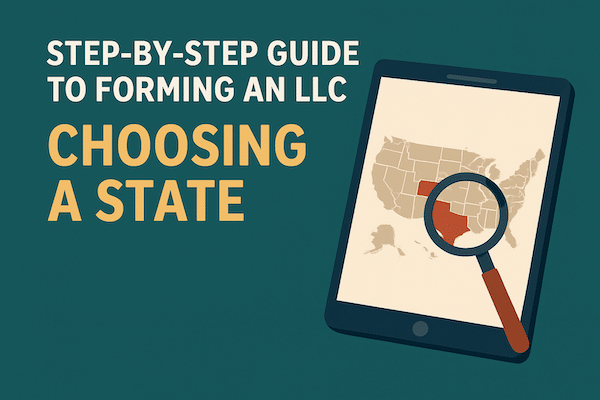Picking the Best State to Form Your LLC

You’ve chosen a name for your LLC—now comes the next big decision: where to form it.
Most small business owners assume they should register in their home state, and often, that’s the best choice. But you may have also heard about forming an LLC in places like Delaware, Nevada, or Wyoming, which are often marketed as “business-friendly.”
So how do you know what’s right for you? Let’s break it down.
Why Most People Choose Their Home State
For the majority of small businesses, forming your LLC in the state where you live and work is the simplest and most cost-effective option. Here’s why:
- You’re already operating there. If your business is physically located in your home state, you’ll need to be registered there anyway.
- Avoid double fees. If you form your LLC in another state, you may also have to register as a “foreign LLC” in your home state—meaning two sets of fees and filings.
- Local credibility. Customers, banks, and partners may prefer dealing with a business registered in the community it serves.
If your business is local or service-based—think freelancers, shops, contractors—your home state is almost always the right choice.
The Case for Other States
So why do some entrepreneurs look elsewhere? A few states have earned reputations for being “LLC-friendly.”
- Delaware – Popular with larger corporations and investors. Offers strong legal protections and a well-established court system for business disputes.
- Nevada – No state income tax and minimal reporting requirements.
- Wyoming – Low filing fees, strong privacy protections, and no state income tax.
These advantages can matter for big companies, startups planning to raise capital, or businesses that want specific legal protections. But for most small business owners, the extra complexity isn’t worth it.
Factors to Consider
When deciding where to form your LLC, ask yourself:
- Where do my customers live? If most of your business happens locally, your home state makes sense.
- Am I planning to raise outside investment? If so, Delaware could be appealing.
- Do I want to keep costs and paperwork as low as possible? Staying local is usually the easiest.
Costs and Fees
Each state sets its own filing fees and annual maintenance costs. Some charge as little as $50 to start an LLC, while others charge several hundred dollars, plus yearly renewal fees.
Pro tip: Check your state’s Secretary of State website for the latest fee schedule. This ensures you budget correctly and avoid surprises.
Final Thought
Choosing the right state for your LLC comes down to balance: legal protection, costs, and where you’ll actually do business. For most small business owners, forming your LLC in your home state is the simplest and smartest move. Once you’ve picked your state, you’re ready for the next major milestone.
Up Next: “Filing Your Articles of Organization.”

Responses